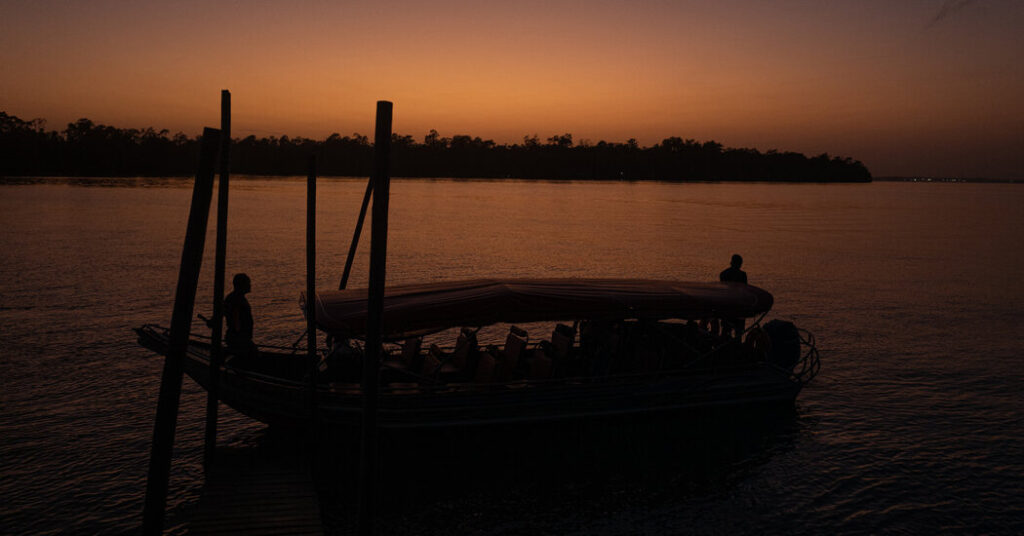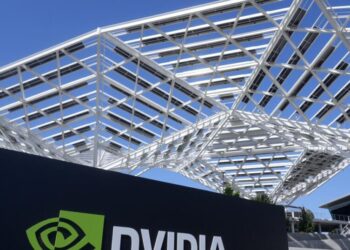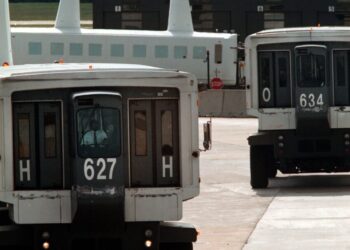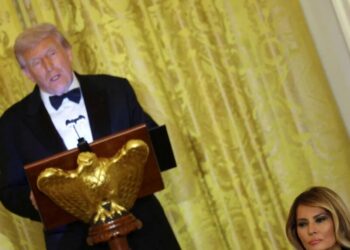On one side of the bay, cruise ships tower above the trees, serving as temporary hotels for thousands of people attending the U.N. climate talks nearby. Ship lights twinkle as diplomats wrestle with how to provide an electricity-gobbling world with cleaner sources of power.
But just across the bay is an utterly different world, one where electricity arrived only this year for some. Many more are still waiting for it.
This is a reality for hundreds of millions of people worldwide who still lack access to power, one of modernity’s most essential innovations.
“They’re marvelous, aren’t they?” said Joelma Morães Anjo, a lifelong resident of Paquetá Island, who was admiring the gleaming ships from her home, where reliable electricity was installed about nine months ago. “It’s almost like we’re part of COP,” she said, using the abbreviation for the U.N. talks being held just a few miles away in Belém, a sprawling city on the edge of the Amazon rainforest.
The vast majority of people without electricity live in Africa, but the numbers in the Western Hemisphere are not small either. Some 17 million go entirely without and 60 million more rely on diesel, one of the dirtiest and most expensive forms of fuel, to run small generators. In Brazil’s Amazon, one million people have no access and two million more use diesel.
Across South America and the Caribbean, nearly all of those people are Indigenous, Afro-descendant or, like on Paquetá and Jutuba islands, part of ethnically mixed communities that live along the banks of the Amazon and its myriad tributaries.
In terms of greenhouse gas emissions that accelerate climate change, their contribution is infinitesimal. The average American refrigerator, running every second of the year, would contribute more in terms of emissions than most of them. But the question of how the world’s poor get access to power is as pressing as ever.
As populations grow, reliance on charcoal as a cooking fuel has become a major contributor to deforestation, for instance. And many governments in the developing world have argued that despite climate concerns, they should not be judged for pursuing fossil fuel development if it means expanding access to electricity more rapidly.
Basic electricity access is, for many, the first step toward participation in a broader economy.
At home, it might mean buying a fridge, a TV and a cellphone with a camera and messaging apps that you can reliably keep charged. In a community, it might mean a speaker system at church or public Wi-Fi. Access to electric-powered machines, such as an oil press, can make production more efficient, allowing people to earn more.
Whatever the case, the question of whether or not one has electricity ripples out into nearly every moment of life.
That was on display last weekend on a sandy field just across the water from the COP cruise ships, where residents of Jutuba and Paquetá islands gathered for a five-on-five soccer tournament. The champion would win a bull, though a prize bull this was not — it was mangy, with skewed horns.
But as darkness fell, the final had yet to be played. The referee had not been able to keep the games on schedule, and sunset forced the end of the tournament. The two finalist teams agreed to slaughter the bull and share its meat.
While traditional ways of life are often romanticized in the conversation around climate change, if people are given the option to access electricity, “very few will choose to go without it,” said Isabel Beltrán, who oversees Latin America and the Caribbean for the Global Energy Alliance for People and Planet, a philanthropic fund that finances clean energy projects. That is as much about earning money as it is about simply making life easier.
Antonia Maia, 80, the matriarch of one of Paquetá’s couple dozen families, spent most of her life without electricity before getting a solar-powered battery system through a government program this year. “You had to either use salt or go buy ice every day to keep the fish from spoiling,” she said.
Her extended family mostly earns by fishing and harvesting açaí from the palms that surround their homestead. “It’s a lot of work and a lot of money. Thanks to God we don’t spend like that anymore,” she said.
Ms. Maia’s extended family lives together on the edge of Paquetá in a compound of houses raised on stilts and connected by narrow boardwalks. This year they received three of the nearly 300 battery systems installed on the island by Equatorial Energia, northern Brazil’s biggest utility company, which is working with the government to roll out its flagship rural electrification program, Light for All. They pay around $5 a month for each of the batteries.
Brazil’s current president, Luiz Inácio Lula da Silva, started the program during his first term in office over two decades ago. Since then, more than 17 million people have gotten electricity through it. The Amazon region is now its main focus, where it is largely offering solar-powered battery systems like Ms. Maia’s.
“Most gains in electrification come from expanding a grid,” Ms. Beltrán said, “but for the harder-to-reach communities, you need to put in a much more conscious effort.”
Paquetá and Jutuba aren’t exactly hard to reach. A kite surfer from one of the cruise ships easily crossed the channel to the islands during the soccer tournament. In the distance, through thick, humid air, the skyline of Belém, a city of nearly two million people, shimmered in the haze.
However slow electricity has been to arrive there, Ms. Maia’s extended family is thrilled to have it. Ms. Maia, who has nine children, said she had lost count of her grandchildren and great-grandchildren. Many of them had gathered in their compound to travel by boat together to the tournament.
By the time they returned home, the solar batteries had kicked in. Ms. Maia was already in her hammock watching “Fantástico,” a variety show, on TV.
A cacophony of sounds emanated from an array of cellphones. Her 42-year-old son, Raimundo Maia Morães, a burly man who spends his early mornings climbing the palms to pick açaí berries, had opened up a Chinese-themed online casino app called Little Tiger. He chortled to the sound of a zither while digital coins zoomed across the screen.
“Just a losing a little money before bed,” he said. “Ha!”
Max Bearak is a Times reporter who writes about global energy and climate policies and new approaches to reducing greenhouse gas emissions.
The post As the World Pursues Clean Power, Millions Still Have No Power at All appeared first on New York Times.




